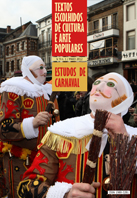UNA MIRADA AL CARNAVAL DESDE LA PERSPECTIVA DE LA ANTROPOLOGÍA SIMBÓLICA DE CLIFFORD GEERTZ Y LA ANTROPOLOGÍA ESTRUCTURALISTA DE LÉVI-STRAUSS
DOI:
https://doi.org/10.12957/tecap.2012.10294Λέξεις-κλειδιά:
CARNAVAL, ESTUDIANTES, MÚSICA, CULTURA, SIMBÓLICO, UNIVERSIDAD NACIONAL DE COLOMBIA, BOGOTÁ, REVISTA CONTESTARTE.Περίληψη
DOI: http://dx.doi.org/10.12957/tecap.2012.10294
La cultura, desde la perspectiva de Clifford Geertz y Lévi-Strauss, es entendida como una “urdimbre” de significados, como un conjunto de “sistemas simbólicos”. Esta concepción se ha denominado definición semiótica de la cultura. En estas páginas se intenta edificar una interpretación del carnaval como expresión fundamental de diferentes grupos sociales. Se analiza el carnaval estudiantil de los años 20 y 30 en la ciudad de Bogotá, con el propósito de descifrar su simbología específica y reconocer su sentido, su función social y las transformaciones que efectuó en la comunidad universitaria y la ciudad de Bogotá.
Λήψεις
Δημοσιευμένα
2012-05-01
Πώς να δημιουργήσετε Αναφορές
Mendoza, C. B. (2012). UNA MIRADA AL CARNAVAL DESDE LA PERSPECTIVA DE LA ANTROPOLOGÍA SIMBÓLICA DE CLIFFORD GEERTZ Y LA ANTROPOLOGÍA ESTRUCTURALISTA DE LÉVI-STRAUSS. Textos Escolhidos De Cultura E Arte Populares, 9(1). https://doi.org/10.12957/tecap.2012.10294
Τεύχος
Ενότητα
Artigos
Άδεια
Autores que publicam nesta revista concordam com os seguintes termos:- Autores mantém os direitos autorais e concedem à revista o direito de primeira publicação, com o trabalho simultaneamente licenciado sob a Licença Creative Commons Attribution que permite o compartilhamento do trabalho com reconhecimento da autoria e publicação inicial nesta revista.
- Autores têm autorização para assumir contratos adicionais separadamente, para distribuição não-exclusiva da versão do trabalho publicada nesta revista (ex.: publicar em repositório institucional ou como capítulo de livro), com reconhecimento de autoria e publicação inicial nesta revista.
- Autores têm permissão e são estimulados a publicar e distribuir seu trabalho online (ex.: em repositórios institucionais ou na sua página pessoal) a qualquer ponto antes ou durante o processo editorial, já que isso pode gerar alterações produtivas, bem como aumentar o impacto e a citação do trabalho publicado (Veja O Efeito do Acesso Livre).

